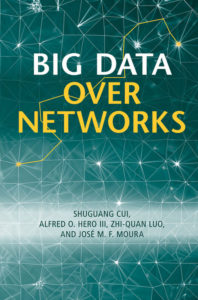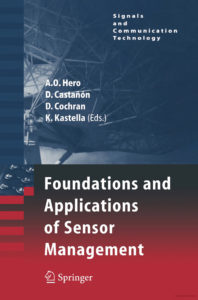Books
Big Data over Networks

Editors: Shuguang Cui, Texas A & M University; Alfred O. Hero, III, University of Michigan, Ann Arbor; Zhi-Quan Luo, University of Minnesota; José M. F. Moura, Carnegie Mellon University, Pennsylvania
Utilizing both key mathematical tools and state-of-the-art research results, this text explores the principles underpinning large-scale information processing over networks and examines the crucial interaction between big data and its associated communication, social and biological networks. Written by experts in the diverse fields of machine learning, optimization, statistics, signal processing, networking, communications, sociology and biology, this book employs two complementary approaches: first analyzing how the underlying network constrains the upper-layer of collaborative big data processing, and second, examining how big data processing may boost performance in various networks. Unifying the broad scope of the book is the rigorous mathematical treatment of the subjects, which is enriched by in-depth discussion of future directions and numerous open-ended problems that conclude each chapter. Readers will be able to master the fundamental principles for dealing with big data over large systems, making it essential reading for graduate students, scientific researchers and industry practitioners alike.
Foundations and Applications of Sensor Management

Editors: Hero, A.O., Castanon, D., Cochran, D., Kastella, K. (Eds.)
Foundations and Applications of Sensor Management presents the emerging theory of sensor management with applications to real-world examples such as landmine detection, adaptive signal and image sampling, multi-target tracking, and radar waveform scheduling. It is written by leading experts in the field for a diverse engineering audience ranging from signal processing, to automatic control, statistics, and machine learning. The level of treatment of the book is tutorial and self-contained.
The chapters of the book follow a logical development from theoretical foundations to approximate approaches and ending with applications. The coverage includes the following topics: stochastic control foundations of sensor management; multi-armed bandits and their connections to sensor management; information-theoretic approaches; managed sensing for multi-target tracking; approximation methods based on embedded simulation; active learning for classification and sampling; and waveform scheduling for radar. An appendix is included to provide essential background on topics the reader may not have encountered as a first-year graduate student: Markov decision processes; information theory; and stopping times.
Foundations and Applications of Sensor Management is an important reference for signal processing and control engineers and researchers as well as machine learning application developers.

 MENU
MENU 